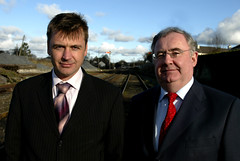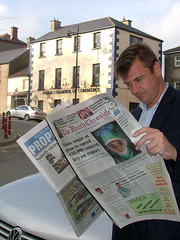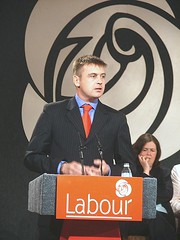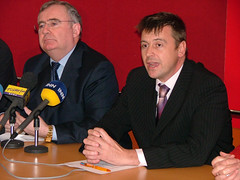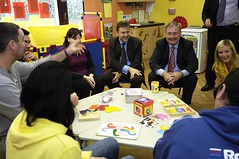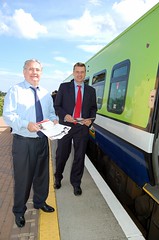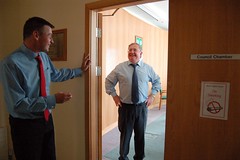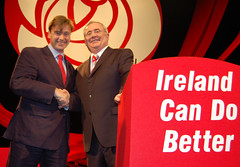Tuesday, December 15, 2009
Looking for Solutions from Copenhagen
This article appeared in The Irish Daily Mirror on 14th December 2009
If we were in any doubt as to what climate change could mean to Ireland then last month’s floods will have washed that away. Cities, towns and rural areas across the country were underwater for days. Normal life was put on hold. That’s why this month’s conference of 110 world leaders in Copenhagen is so important. We need to agree together on measures to take that will protect our planet and our people.
Copenhagen is an excellent choice for the conference. World leaders will be impressed by the public transport system and by how easy it is to walk and cycle around. The Danes have been doing eco-friendly for decades.
The organisers have brought the conference onto the city’s streets. Dotted around the city are climate change event tents. In one of the city’s biggest squares, Kongens Nytorv, a tent hosts a photographic exhibition called “Hard Rain”, named after the Bob Dylan song. Each line from Dylan’s song is represented by hard-hitting pictures from around the world, illustrating the impact of climate change, poverty and inequality. The book, also called Hard Rain, will be a great present for a few friends for Christmas.
The impact of climate change on our coasts is particularly worrying. Ireland could face a rise in sea levels of half a metre by the end of the century, meaning that many of our coastal towns and villages would have to be abandoned. My local scout group from East Meath recently came into Leinster House to express their worries about the impact of rising sea levels in Laytown and Bettystown. The issue faces many communities across the world. Some islands, such as the Maldives, and Tuvalu, could disappear altogether.
To highlight this issue Friends of the Earth arranged for thousands of people to turn up dressed in blue outside the Danish Parliament. I joined this ocean of people. To make a wave we all knelt down and then first the front section of the crowd stood up, then the middle section stood up and then the back section. We repeated this a few times, mimicking giant blue waves hitting the sea shore.

Campaigners take to the streets in Copenhagen
Around the city thousands of campaigners and pressure groups are hosting and attending events like these, trying to make their voices heard. The vast numbers of TV and media people are helping to get that message on the world stage too. The crowds on the streets are mostly young and seem to be good-natured. However the local police are taking no chances. Police vans are everywhere. On every pavement are officers armed with what appear to me to be tear-gas canisters. They look like they mean business.

Police Wagons at the ready
At the Klima centre the range of climate change workshops and seminars is impressive (think of The Late Late Christmas Toy Show for environmentalists). Their aim is to showcase how local communities can work to make a difference in their own town or village.
One seminar focused on how sheep farmers in North Wales got together to form a co-operative to erect three wind turbines to provide electricity for 1,600 homes. The project has been so successful that the farmers plan to put up another seven turbines, in the process generating enough energy to power a further 7,000 Welsh homes. For me it shows that local people, acting as a community, can really make things happen.
That was also the message from Nobel Peace Prize winner Professor Wangari Maathai, who spoke to us at an evening seminar in the Danish Film Institute. She won the 2004 peace prize for setting up Kenya’s Green Belt Movement, which has planted over 35 million tress in Kenya and helped to combat illegal logging and deforestation.
I raised this issue in Leinster House a couple of months ago. I want our Government to stop using illegally logged timber in public buildings. The answer I got from the Minister was that “he would look at it”. After listening to what Professor Maathai said I’m going to table a parliamentary question next week to try to put pressure on the government to do this sooner rather than later.
Professor Maathai’s advice on what each individual can do is clear. She says that we cannot just leave matter to the politicians. Action by people in their own communities, combined with political will at a national and international level is what is needed, and it’s needed soon. As Martin Luther King once said, we are faced with the Fierce Urgency of Now. That should be the message coming out of Copenhagen.
If we were in any doubt as to what climate change could mean to Ireland then last month’s floods will have washed that away. Cities, towns and rural areas across the country were underwater for days. Normal life was put on hold. That’s why this month’s conference of 110 world leaders in Copenhagen is so important. We need to agree together on measures to take that will protect our planet and our people.
Copenhagen is an excellent choice for the conference. World leaders will be impressed by the public transport system and by how easy it is to walk and cycle around. The Danes have been doing eco-friendly for decades.
The organisers have brought the conference onto the city’s streets. Dotted around the city are climate change event tents. In one of the city’s biggest squares, Kongens Nytorv, a tent hosts a photographic exhibition called “Hard Rain”, named after the Bob Dylan song. Each line from Dylan’s song is represented by hard-hitting pictures from around the world, illustrating the impact of climate change, poverty and inequality. The book, also called Hard Rain, will be a great present for a few friends for Christmas.
The impact of climate change on our coasts is particularly worrying. Ireland could face a rise in sea levels of half a metre by the end of the century, meaning that many of our coastal towns and villages would have to be abandoned. My local scout group from East Meath recently came into Leinster House to express their worries about the impact of rising sea levels in Laytown and Bettystown. The issue faces many communities across the world. Some islands, such as the Maldives, and Tuvalu, could disappear altogether.
To highlight this issue Friends of the Earth arranged for thousands of people to turn up dressed in blue outside the Danish Parliament. I joined this ocean of people. To make a wave we all knelt down and then first the front section of the crowd stood up, then the middle section stood up and then the back section. We repeated this a few times, mimicking giant blue waves hitting the sea shore.

Campaigners take to the streets in Copenhagen
Around the city thousands of campaigners and pressure groups are hosting and attending events like these, trying to make their voices heard. The vast numbers of TV and media people are helping to get that message on the world stage too. The crowds on the streets are mostly young and seem to be good-natured. However the local police are taking no chances. Police vans are everywhere. On every pavement are officers armed with what appear to me to be tear-gas canisters. They look like they mean business.

Police Wagons at the ready
At the Klima centre the range of climate change workshops and seminars is impressive (think of The Late Late Christmas Toy Show for environmentalists). Their aim is to showcase how local communities can work to make a difference in their own town or village.
One seminar focused on how sheep farmers in North Wales got together to form a co-operative to erect three wind turbines to provide electricity for 1,600 homes. The project has been so successful that the farmers plan to put up another seven turbines, in the process generating enough energy to power a further 7,000 Welsh homes. For me it shows that local people, acting as a community, can really make things happen.
That was also the message from Nobel Peace Prize winner Professor Wangari Maathai, who spoke to us at an evening seminar in the Danish Film Institute. She won the 2004 peace prize for setting up Kenya’s Green Belt Movement, which has planted over 35 million tress in Kenya and helped to combat illegal logging and deforestation.
I raised this issue in Leinster House a couple of months ago. I want our Government to stop using illegally logged timber in public buildings. The answer I got from the Minister was that “he would look at it”. After listening to what Professor Maathai said I’m going to table a parliamentary question next week to try to put pressure on the government to do this sooner rather than later.
Professor Maathai’s advice on what each individual can do is clear. She says that we cannot just leave matter to the politicians. Action by people in their own communities, combined with political will at a national and international level is what is needed, and it’s needed soon. As Martin Luther King once said, we are faced with the Fierce Urgency of Now. That should be the message coming out of Copenhagen.
Sunday, December 06, 2009
North-South Matters
On Monday I accompanied Eamon Gilmore to Stormont in Northern Ireland. The purpose of the visit was to meet with the various party leaders in the north, and to receive an update on the current situation there.
At the moment there is a bit of an impasse in the devolution of policing and justice powers. It is hoped that the situation will improve soon, because we are about to enter the Westminster election, which by law has to be held before next summer. If things go on much longer then the issue will probably get parked until some time after those elections.
Eamon and I had separate meetings with First Minister Peter Robinson, Martin McGuinness and Gerry Kelly of Sinn Fein, Sir Reg Empey of the Official Unionist and Conservative Party and with David Ford of the Alliance Party. We also met Mark Durcan, Alistair McDonnell and Margaret Richie of the SDLP.

First Minister Peter Robinson, Eamon Gilmore and me at Stormont
Apart from talking about issues in relation to the ongoing peace process, I also brought up the issue of north-south shopping and of cross-border tourism.
It was a fascinating two days for me. I had not been in Stormont previously, even though it's only 90 minutes from my front door in Drogheda. It's a beautiful building, the setting is great and it seems a lot smaller inside than Leinster House. I'd say the politicians are bumping into each other all the time (something with an updside and a downside!)
The next day I met some of the same people again, this time at a meeting in Leinster House. The Sub Committee on Overseas Development, of which I am a member, met with our northern counterparts to discuss our aid programmes. Among the northern delegation were Carmel Hanna of the SDLP (who was a VSO volunteer with me last year), Alliance Party Leader David Ford and Mr Jim Wells of the DUP. I met Jim a few years back when I brought him around the Battle of the Boyne site at Oldbridge - he was concerned about the impact of the Duleek incinerator on the site.
We had a mutual exchange of views on our aid programs. Later that day I spoke to a Scout Group from East Meath about our aid programme. They were in Leinster House to lobby for the protection of the aid budget. Apart from myself and other local politicians, we were also addressed by Minister Peter Power. The scouts made a great presentation and it was nice to see the commitment and effort they made to make their case for the continuation of development aid.
Finally, flooding continues to be an issue around the country. I attended a residents association meeting for The Northlands on Thursday evening. Residents are concerned about the lack of adequate drainage, as well as of safety issues in relation to children managing to get in to the stream in the estate. We will be following up these issues with the council over the next while.
At the moment there is a bit of an impasse in the devolution of policing and justice powers. It is hoped that the situation will improve soon, because we are about to enter the Westminster election, which by law has to be held before next summer. If things go on much longer then the issue will probably get parked until some time after those elections.
Eamon and I had separate meetings with First Minister Peter Robinson, Martin McGuinness and Gerry Kelly of Sinn Fein, Sir Reg Empey of the Official Unionist and Conservative Party and with David Ford of the Alliance Party. We also met Mark Durcan, Alistair McDonnell and Margaret Richie of the SDLP.

First Minister Peter Robinson, Eamon Gilmore and me at Stormont
Apart from talking about issues in relation to the ongoing peace process, I also brought up the issue of north-south shopping and of cross-border tourism.
It was a fascinating two days for me. I had not been in Stormont previously, even though it's only 90 minutes from my front door in Drogheda. It's a beautiful building, the setting is great and it seems a lot smaller inside than Leinster House. I'd say the politicians are bumping into each other all the time (something with an updside and a downside!)
The next day I met some of the same people again, this time at a meeting in Leinster House. The Sub Committee on Overseas Development, of which I am a member, met with our northern counterparts to discuss our aid programmes. Among the northern delegation were Carmel Hanna of the SDLP (who was a VSO volunteer with me last year), Alliance Party Leader David Ford and Mr Jim Wells of the DUP. I met Jim a few years back when I brought him around the Battle of the Boyne site at Oldbridge - he was concerned about the impact of the Duleek incinerator on the site.
We had a mutual exchange of views on our aid programs. Later that day I spoke to a Scout Group from East Meath about our aid programme. They were in Leinster House to lobby for the protection of the aid budget. Apart from myself and other local politicians, we were also addressed by Minister Peter Power. The scouts made a great presentation and it was nice to see the commitment and effort they made to make their case for the continuation of development aid.
Finally, flooding continues to be an issue around the country. I attended a residents association meeting for The Northlands on Thursday evening. Residents are concerned about the lack of adequate drainage, as well as of safety issues in relation to children managing to get in to the stream in the estate. We will be following up these issues with the council over the next while.
Tuesday, December 01, 2009
Ireland leads the fight against AIDS in Lesotho
The Kingdom of Lesotho is one of the most unspoilt and beautiful countries in the southern hemisphere. But it’s also one of the poorest, with a shockingly low life expectancy of just 44 years. Almost one out of every four adults has HIV, the third highest rate in the world.
Irish Aid has been in the country since the early ‘70s and it remains one of our nine priority countries. The 2 million inhabitants occupy a land area roughly the size of Munster. Landlocked by South Africa, the country is largely mountainous, apart from the lowland region where the capital, Maseru, is located.
During the apartheid years many countries kept an embassy in Lesotho, preferring to monitor developments in South Africa from here rather than from Pretoria. Once apartheid ended many countries closed their embassies and moved out.
Ireland stayed. Our Ambassador to Lesotho, Paddy Fay, is now the only ambassador from a European country. Our support here has been consistent over the years. Through Irish Aid every Irish man, woman and child gives around €3 a year to Lesotho. Last week as a member of the Foreign Affairs Committee I visited Lesotho to see the Irish Aid programme in action.
Ambassador Fay and his Head of Development, Pat Curran, guided us through the Irish Aid program during our visit. Our programme is focussed on several different strands, including the fight against HIV / AIDS. The disease has permeated the entire country, reaching deep into isolated rural mountain areas. It is thought that the spread is linked to returning migrant workers from the South African mines.
Working with the Ministry of Health and the Clinton Foundation, our programme has built 7 new health clinics in these rural areas, which can often be hours away from the nearest road. Typically each clinic serves about 100 local villages, providing health cover to about 100,000 people. In each clinic we visited there was just one doctor, supported by a handful of nurses. The staff undertake HIV testing and monitoring, and proscribe and provide the Anti-Retroviral Therapies (ARTs) to patients. The clinics also provide other general health care to the local population. Two more clinics are in the pipeline, which will mean that coverage is extended to a further 200,000 people.
Because of the remoteness of the areas the recruitment and retention of staff has proved difficult in the past. Irish Aid has assisted with the recruitment of over 100 nurses and has provided a “mountain working allowance” of 10% of salary to encourage nurses to remain. The recruitment and retention problem also affects doctors. I spoke to the doctor at the Nkau clinic. Originally from Maseru, he left Lesotho to study in South Africa. He came back to practise, but many of his fellow doctors stayed in South Africa. They didn’t just stay for the money, he told me, it was also that the opportunity for professional development, for instance in radiology, cardiology, or other fields, was greater in a more developed health system. “If I stay in Lesotho then I can only ever be a GP”, he said.
The clinics can be up to two days walk away for some – too far for many ill people. Where possible these are served by outreach health workers, who travel on the dirt roads by motorbike. These bikers provide a service that would otherwise not be available for many. Last year the singer Elton John donated 120 motorbikes to these health centres, saying “We want to improve the transport system by bringing health care to millions of people living in the most rural areas and thus make a difference in their lives.”
Our aid money also supports a rural food security project run by the Catholic Relief Services. Their Head of Programs, Adam Weimer, described how he works with families affected by HIV to improve their access to fresh vegetables. Beside their homes they build “Keyhole gardens” - small waist-high beds of about 2m in diameter - which the patients can tend to with little exertion and without bending. These beds provide a plentiful supply of onions, carrots, potatoes, maize etc, thus ensuring that the patients have a healthy diet whilst undergoing ART.
The programme has worked with households to establish about 5,000 of these gardens in rural areas. The costs of the gardens are largely up front: once built the gardens can last for years. Adam pointed out that a budget cut of €50,000 would prevent him from extending the program to another 2,000 people.
Walking around the villages and the health centres it is evident that the combined approached being taken by Irish Aid and our partners is having a significant impact on the health of the local population, and that the results have been dramatic. The only loser appears to be the local coffin maker. Ambassador Fay recounts how when he first visited here, people were literally coming in the front door of the clinic and being taken out the back shortly afterwards by the local undertaker. With the success of the ART drugs that undertaker has now gone out of business. “I just wasn’t getting customers anymore”, said the undertaker. “It’s time for me to move elsewhere”.
The advent of ART has had a large impact on the how the disease is perceived. Before drugs were available there was a huge stigma associated with the disease, which meant that many people failed to seek treatment. This denial no doubt helped to spread the disease. Now, with treatment so readily available, carriers feel less stigmatised and seek tests and treatment sooner.
The fact that the Irish mission is one of the oldest, largest and most giving is not lost on the government of Lesotho. At a working lunch at the Embassy Ambassador Fay hosted the Minister for Finance, the Minister for Health and the Minister for Public Works. Their joint presence illustrates the importance that Lesotho attaches to the continuation of the Irish Aid programme.
The Minister of Health asked that we take a clear message of gratitude back to the Irish people, adding that “without Irish help thousands of people who are alive today would be dead. Thousands of children would be orphans.”
The fight against HIV / AIDS has come a long way in the last decade. Just ten years ago the impact of stigmatisation, the lack of access to drugs, and food insecurity were huge problems. Now the hopelessness has gone. Because of the Irish Aid program thousands of HIV sufferers and their children have a chance of having a healthier, longer life.
Irish Aid has been in the country since the early ‘70s and it remains one of our nine priority countries. The 2 million inhabitants occupy a land area roughly the size of Munster. Landlocked by South Africa, the country is largely mountainous, apart from the lowland region where the capital, Maseru, is located.
During the apartheid years many countries kept an embassy in Lesotho, preferring to monitor developments in South Africa from here rather than from Pretoria. Once apartheid ended many countries closed their embassies and moved out.
Ireland stayed. Our Ambassador to Lesotho, Paddy Fay, is now the only ambassador from a European country. Our support here has been consistent over the years. Through Irish Aid every Irish man, woman and child gives around €3 a year to Lesotho. Last week as a member of the Foreign Affairs Committee I visited Lesotho to see the Irish Aid programme in action.
Ambassador Fay and his Head of Development, Pat Curran, guided us through the Irish Aid program during our visit. Our programme is focussed on several different strands, including the fight against HIV / AIDS. The disease has permeated the entire country, reaching deep into isolated rural mountain areas. It is thought that the spread is linked to returning migrant workers from the South African mines.
Working with the Ministry of Health and the Clinton Foundation, our programme has built 7 new health clinics in these rural areas, which can often be hours away from the nearest road. Typically each clinic serves about 100 local villages, providing health cover to about 100,000 people. In each clinic we visited there was just one doctor, supported by a handful of nurses. The staff undertake HIV testing and monitoring, and proscribe and provide the Anti-Retroviral Therapies (ARTs) to patients. The clinics also provide other general health care to the local population. Two more clinics are in the pipeline, which will mean that coverage is extended to a further 200,000 people.
Because of the remoteness of the areas the recruitment and retention of staff has proved difficult in the past. Irish Aid has assisted with the recruitment of over 100 nurses and has provided a “mountain working allowance” of 10% of salary to encourage nurses to remain. The recruitment and retention problem also affects doctors. I spoke to the doctor at the Nkau clinic. Originally from Maseru, he left Lesotho to study in South Africa. He came back to practise, but many of his fellow doctors stayed in South Africa. They didn’t just stay for the money, he told me, it was also that the opportunity for professional development, for instance in radiology, cardiology, or other fields, was greater in a more developed health system. “If I stay in Lesotho then I can only ever be a GP”, he said.
The clinics can be up to two days walk away for some – too far for many ill people. Where possible these are served by outreach health workers, who travel on the dirt roads by motorbike. These bikers provide a service that would otherwise not be available for many. Last year the singer Elton John donated 120 motorbikes to these health centres, saying “We want to improve the transport system by bringing health care to millions of people living in the most rural areas and thus make a difference in their lives.”
Our aid money also supports a rural food security project run by the Catholic Relief Services. Their Head of Programs, Adam Weimer, described how he works with families affected by HIV to improve their access to fresh vegetables. Beside their homes they build “Keyhole gardens” - small waist-high beds of about 2m in diameter - which the patients can tend to with little exertion and without bending. These beds provide a plentiful supply of onions, carrots, potatoes, maize etc, thus ensuring that the patients have a healthy diet whilst undergoing ART.
The programme has worked with households to establish about 5,000 of these gardens in rural areas. The costs of the gardens are largely up front: once built the gardens can last for years. Adam pointed out that a budget cut of €50,000 would prevent him from extending the program to another 2,000 people.
Walking around the villages and the health centres it is evident that the combined approached being taken by Irish Aid and our partners is having a significant impact on the health of the local population, and that the results have been dramatic. The only loser appears to be the local coffin maker. Ambassador Fay recounts how when he first visited here, people were literally coming in the front door of the clinic and being taken out the back shortly afterwards by the local undertaker. With the success of the ART drugs that undertaker has now gone out of business. “I just wasn’t getting customers anymore”, said the undertaker. “It’s time for me to move elsewhere”.
The advent of ART has had a large impact on the how the disease is perceived. Before drugs were available there was a huge stigma associated with the disease, which meant that many people failed to seek treatment. This denial no doubt helped to spread the disease. Now, with treatment so readily available, carriers feel less stigmatised and seek tests and treatment sooner.
The fact that the Irish mission is one of the oldest, largest and most giving is not lost on the government of Lesotho. At a working lunch at the Embassy Ambassador Fay hosted the Minister for Finance, the Minister for Health and the Minister for Public Works. Their joint presence illustrates the importance that Lesotho attaches to the continuation of the Irish Aid programme.
The Minister of Health asked that we take a clear message of gratitude back to the Irish people, adding that “without Irish help thousands of people who are alive today would be dead. Thousands of children would be orphans.”
The fight against HIV / AIDS has come a long way in the last decade. Just ten years ago the impact of stigmatisation, the lack of access to drugs, and food insecurity were huge problems. Now the hopelessness has gone. Because of the Irish Aid program thousands of HIV sufferers and their children have a chance of having a healthier, longer life.

